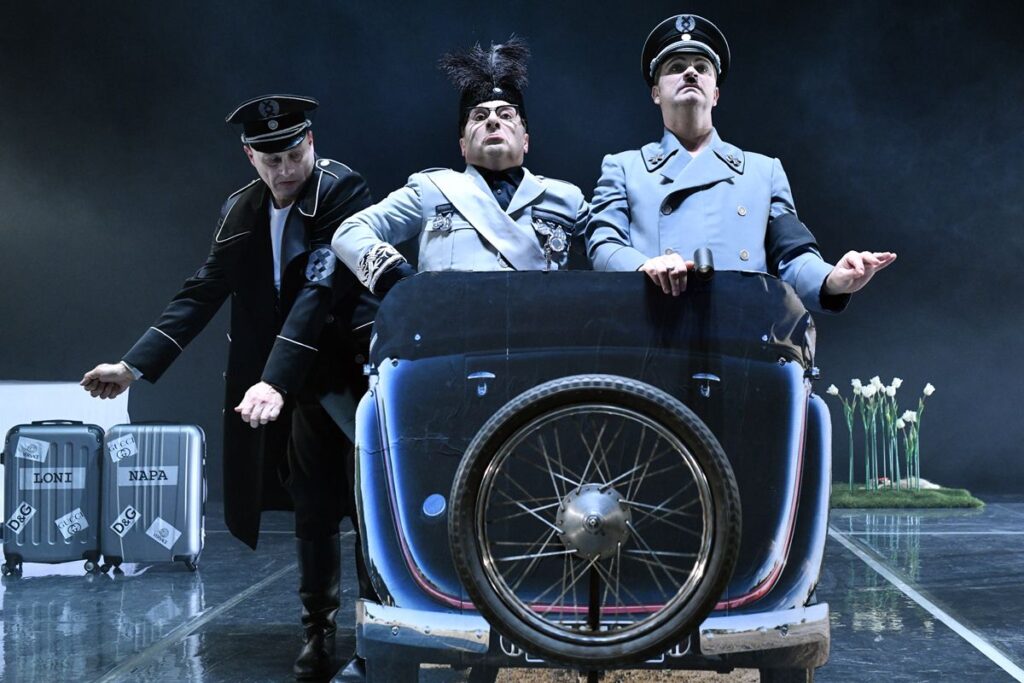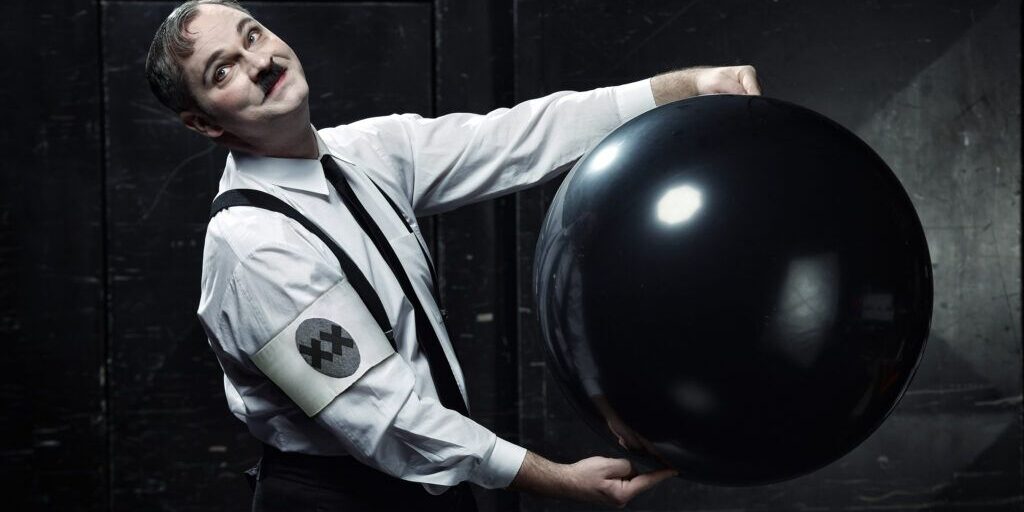SNG Drama Ljublana, premiered 4th May 2022
A lot of things happened in the first months of 2022. Not only the war in Ukraine, but also major elections in France and Hungary and elections in the region, which in one way or another answered the question of what kind of leadership we want in the future.
Regardless of the outcome of these election, the voters in all cases were faced with the choice of the far-right or an alternative. The alternative may not necessarily be good but is at least it’s a less bad option than nationalist figures who are steadily gaining support in Europe.
Early in the 20th century, Charlie Chaplin responded to the sudden rise of Nazism by making the film The Great Dictator. Released in 1940, it dared to provide an alternative view of an autocrat who forged plans for a “better world.” At a time when we are having to decide between nationalist figures and (any) alternative in our elections, the topic could not be more relevant.
After the premiere was postponed many times, a new work The Great Dictator – based on Chaplin’s film – finally opened on the main stage of SNG Drama.
Staging a comedy and more specifically, a black and white comedy movie, is not new for theatre director Diego de Brea. As in his performance Ko sem bil mrtev, this performance is heavily fuelled by film language, with its physically stylized acting, caricatured characters, black and white visual imagery, and other characteristics of silent film (though speech and dialogues also appear in The Great Dictator). The way women are portrayed also feels like it’s of an earlier time.
The performance seems like an attempt to redraw the film on the stage. I would recommend that people watch the film before going to the theatre, as the performance focuses more on showing individual situations than on clearly conveying a comprehensive story (which is not very clear even in the film).
The narrative follows the dictator Hynkel and a Jewish barber, who are on opposite sides of the story of rising Nazism (in the fictional land of Tomania) but look the same, which ultimately leads to a comedy of confusion and ‘replacement’ of the dictator.
First the pianist Joži Šalej, who is also the composer of the performance, steps on stage. His piano music, which accompanies the live events on stage, is reminiscent of the screening of silent films. The piano sometimes follows the movement and sometimes sets the rhythm for the performers. The pianist’s playing is excellent and takes place continuously from the beginning to the end of the performance.

The Great Dictator, SNG Drama Ljubljana. Photo: Peter Uhan
As in the film, the two main characters are played by the same actor – Jurij Zrnec. The other smaller characters are shared by the other male actors. Zrnec, known for his comic roles in Slovenian theatre and television, with his skilful stylized movement and facial expressions, creates a theatrically full character and rarely resorts to clichéd comic solutions. Bojan Emeršič also excels in the role of Napaloni, a competitive dictator from another country and despite his short stage time manages to physically convey the character in all his arrogance and egoism. The other male actors, however, are not so consistent in their characters. As a result, the first scene feels rather cumbersome, when three soldiers run onto the stage in a stylized manner and bump into each other in a way that makes you wonder why there was no movement advisor in the creative team.
As the show progresses, their performances become more fluid, but less elaborate than the performance of the main protagonist. Among the bright spots, the surprising scene when Valter Dragan disguises himself as an attractive female agent and completely stuns the Dictator with ‘her’ voice and stature, also stands out. But this mini role cannot be understood without comparing it to the roles of two actresses, who are also the only women among the creative team. Eva Jesenovec and Tina Vrbnjak, representatives of the younger generation, perform in a strictly defined position of female function, without any attempt to diversify their roles, not just in the sense of psychologically deepening their roles but also in the comic sense. With rare exceptions, the actresses remain what they are – young, beautiful women – and the argument that it this is just like this because it’s also the way it was in the movie is just too simple.
Moreover, the strict imitation of the film’s visual expression does not necessarily do a favour to the show. Not only does the depiction of film scenes on stage sometimes remain unclear in terms of content if the viewer does not have a good memory of the film, but it is also not very funny – some comic relief would at least compensate for the lack of message. Above all, the straightforward following of the film’s template raises a question about the purpose of the performance.
After Hitler, we have encountered quite a few new dictators, both global and local, great and small, so the show’s ideas lose their sharpness. It comes to feel like a pale reflection of an earlier, more simplistic understanding of fascist and nationalist ideology.
In the concluding with the famous ‘New Dictator’ monologue, Zrnec succeeds in a transition to a more intimate mode of narration without excessive pathos, so that the call for peace and respect among all people of the world seems powerful, albeit not as an organic rounding-up of the performance we have just witnessed.
Credits:
Director: Diego de Brea
Dramaturg: Arko
Costume: Blagoj Micevski
Music: Joži Šalej
For tickets and further information visit: Drama.si
Further reading: review of Sally Potter’s The Party at SNG Drama Ljubljana
Interview with SNG Drama’s Uroš Fürst: “Being an actor can be gladiator-like.”
Iva Š. Slosar is a student of dramaturgy and performing arts. She writes theatre criticism for web portals and participates in the cultural department of Radio Študent (Slovenia). She is also engaged in drama writing and theatrical creation as a practical dramaturg.








